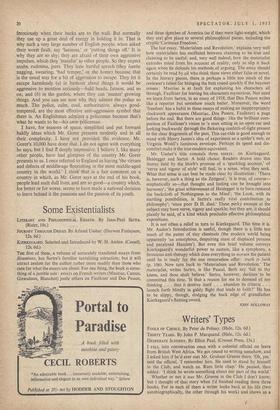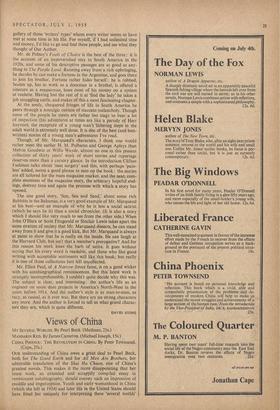Writers' Types
I FELL into conversation once with a colonial official on leave from British West Africa. We got round to writing somehow, and I asked him if he'd ever met Mr. Graham Greene there. 'Oh, yes,' said the official, 'I remember him. He used to stand by himself in the Club, and watch us. Rum little chap.' He paused, then added : 'I think he wrote something about our part of the world.'
Whether or not it was Mr. Greene in. the Club I don't know; but I thought of that story when I'd finished reading these three books. For in each of them a writer looks back at his life (two autobiographically, the other through his work) and shows, us a
gallery of those 'writers' types' whom every writer seems to have met pt some time in his life. For myself, if I had unlimited time and money, I'd like to go and find these people, and see what they thought of Our Author.
Mr. de Polnay's Fools of Choice is the best of the three : it is the account of an impoverished stay in South America in the 1920s, and some of his descriptive passages are as good as any- thing in The Purple Land. Running away from a rich upbringing, he decides he can make a fortune in the Argentine, and goes there to join his brother. Fortune rather hides herself : he is robbed, beaten up, has to work as a doorman in a brothel, is offered a sinecure as a maquereau, loses most of his money on a system at roulette. Having lost the rest of it at 'find the lady' he takes a job smuggling cattle, and makes of this a most fascinating chapter.
At the seedy, chequered fringes of life in South America he peers through a nostalgic curtain of staccato melancholy. Though some of the people he meets are rather too stagy to bear a lot of inspection (his adventures at times are like a parody of Herr lssyvoo), the recapture of a young man's "faltering steps in the adult world is extremely well done. It is one of the best (and best- written) stories of a young man's adventures I've read.
Though, of Mr. Marquatid's characters, I think one would rather meet the earlier H. M. Pulhams and George Apleys than Melvin Goodwin or Willis Wayde, almost no one in this present collection of thirty years' work of short stories and reportage deserves more than a cursory glance. In the introduction Clifton Fadiman talks about 'neat surgery' and this, with perhaps 'pain- less' added, seems a good phrase to sum up the book : the stories are all tailored for the mass magazine market, and the neat, com- plete emotions of the magazine story, the arbitrary hopeful end- ings, destroy time and again the promise with which a story has opened.
The one good story, 'Sun, Sea and Sand,' about some rich Babbitts in the Bahamas, is a very good example of Mr. Marquand at his best—and an example of why he is less a social satirist (which he says he is) than a social chronicler. (It is also a story which I should like very much to see from the other side.) When John O'Hara or Scott Fitzgerald or Sinclair Lewis takes apart the same stratum of society that Mr. Marquand dissects, he can stand away from it and give it a good kick. But Mr. Marquand is always at pains to show that he is really on the inside. He can laugh at the Harvard Club, but isn't that a member's prerogative? And for this reason his work loses the barb of satire. It goes without saying that his every word is readable, and those who like good writing with acceptable sentiments will like this book; but really it is one of those collections best left uncollected.
Mr. Elliot Paul, of A Narrow Street fame, is on a good wicket with his autobiographical reminiscences. But this' atest work is strangely incomprehensible. I couldn't quite decide why this was. The subject is clear, and interesting : the author's life as an engineer on some darn projects in America's North-West in the years before 1914. And the author's style is as man-to-man, as racy, as casual, as it ever was. But there are no strong characters any more. And the author is forced to tell us what grand charac- ters they are, which is quite different.
DAVID STONE















































 Previous page
Previous page